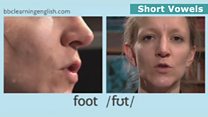Unit 23: Towards Advanced
Grammar, news, vocabulary and pronunciation
Select a unit
- 1 Towards advanced
- 2 Towards advanced
- 3 Towards advanced
- 4 Towards advanced
- 5 Towards advanced
- 6 Towards advanced
- 7 Towards advanced
- 8 Towards advanced
- 9 Towards Advanced
- 10 Towards Advanced
- 11 Towards Advanced
- 12 Towards Advanced
- 13 Towards Advanced
- 14 Towards Advanced
- 15 Towards Advanced
- 16 Towards Advanced
- 17 Towards Advanced
- 18 Towards Advanced
- 19 Towards Advanced
- 20 Towards Advanced
- 21 Towards Advanced
- 22 Towards Advanced
- 23 Towards Advanced
- 24 Towards Advanced
- 25 Towards Advanced
- 26 Towards Advanced
- 27 Towards Advanced
- 28 Towards Advanced
- 29 Towards Advanced
- 30 Towards Advanced
Session 5
Tim's Pronunciation Workshop: gemination of /t/
What happens when a word ends in a /t/ sound and the next word starts with /t/?
Activity 1
Tim's Pronunciation Workshop: The gemination of /t/
It takes two...
Tim's back in his pronunciation workshop. He's looking at what happens when one word ends with a vowel followed by /t/ and the next word starts with a /t/ sound - and his favourite twin brother is here to help!
To do
Take a look at the video, then try the activity to do some practice.
Watch the video and complete the activity

Tim
Hi. I'm Tim and this is my Pronunciation workshop. Here I'm going to show you how English is really spoken. Come on, let's go inside. This week, I’m going to need some help from my favourite twin. Please welcome back Tom, who’s going to help me present. Hi Tom!
Tom
Hi Tim! Now, are you a lover?
Tim
Or a fighter? Do you prefer to dance?
Tom
Or would you rather have an argument?
Tim
There’s an expression we have in English that contains the name of a dance …
Tom
… and means when two people get involved in a fight or argument, then in most cases both have to take some of the responsibility. Do you know the expression?
Tim
Well, let’s ask the people of London.
Voxpops
It takes two to tango.
It takes two to tango.
It takes two to tango.
It takes two to tango.
Tim and Tom
It takes two to tango.
Tom
Lot of ‘t’s in that, Tim.
Tim
Lot of ‘t’s indeed, Tom. Five in fact. It takes two to Tango. But are all of these usually pronounced? Can you hear all of them? Listen again.
Voxpops
It takes two to tango.
It takes two to tango.
It takes two to tango.
It takes two to tango.
Tim
You might remember from a previous video that when the sound /t/ comes in between two consonants, we don’t usually pronounce it.
Tom
But what happens if there is a vowel sound before the /t/? and the next word also begins with /t/?
Tim
Well, in this case the two /t/ sounds join together to create one slightly stronger /t/. So ‘it takes two’ becomes 'it takes two'. This is an example of twinning or gemination. Here are some more examples.
Examples
It took him twenty years to get to the top.
You don’t have to cheat to pass the test.
You were right to be upset.
We took the overnight train to Venice.
Tim
Right, so you’ve heard the examples, and now it’s your turn. You know the drill. Listen and repeat.
Examples
It took him twenty years to get to the top.
You don’t have to cheat to pass the test.
You were right to be upset.
We took the overnight train to Venice.
Tim
Well done. Now remember, if you want to learn more about pronunciation, then please visit our website, bbclearningenglish.com. And that is about it from the pronunciation workshop for this week. We'll see you soon. Bye bye! Ah, thank you for all your hard work, Tom.
Tom
Ah. No problem, you’re the best Tim.
Tim
Hey, thanks, you’re great too. Ah! That was weird! What was that all about?
Tom
Hey, you started it.
Tim
No I didn’t.
Tom
Yes you did.
Tim
Well, maybe a little bit. I guess that just goes to prove it takes two to tango.
To do
So that's a look at the gemination of /t/ in natural spoken English. Now try this activity to get some more practice.
The gemination of /t/ game
6 Questions
Which phrases are examples of gemination of /t/? You decide...
Help
Activity
Which phrases are examples of gemination of /t/? You decide...
Hint
When a word ends in a vowel sound followed by a /t/, and the next word begins with a /t/ sound, the two /t/ sounds join together to make one slightly stronger /t/ sound.Question 1 of 6

Help
Activity
Which phrases are examples of gemination of /t/? You decide...
Hint
When a word ends in a vowel sound followed by a /t/, and the next word begins with a /t/ sound, the two /t/ sounds join together to make one slightly stronger /t/ sound.Question 2 of 6

Help
Activity
Which phrases are examples of gemination of /t/? You decide...
Hint
When a word ends in a vowel sound followed by a /t/, and the next word begins with a /t/ sound, the two /t/ sounds join together to make one slightly stronger /t/ sound.Question 3 of 6

Help
Activity
Which phrases are examples of gemination of /t/? You decide...
Hint
When a word ends in a vowel sound followed by a /t/, and the next word begins with a /t/ sound, the two /t/ sounds join together to make one slightly stronger /t/ sound.Question 4 of 6

Help
Activity
Which phrases are examples of gemination of /t/? You decide...
Hint
When a word ends in a vowel sound followed by a /t/, and the next word begins with a /t/ sound, the two /t/ sounds join together to make one slightly stronger /t/ sound.Question 5 of 6

Help
Activity
Which phrases are examples of gemination of /t/? You decide...
Hint
When a word ends in a vowel sound followed by a /t/, and the next word begins with a /t/ sound, the two /t/ sounds join together to make one slightly stronger /t/ sound.Question 6 of 6

Excellent! Great job! Bad luck! You scored:
End of Unit 23
We hope that was useful. In Unit 24, Masterclass with Sian will be looking at how to be more polite. In News Review and LingoHack you can find out which words are making the headlines - and Tim will be back with the pronunciation workshop as usual. See you there!
Session Vocabulary
Gemination of /t/
When a word ends in a vowel sound followed by a /t/, and the next word begins with a /t/ sound, we don’t pronounce both /t/s. The two /t/ sounds join together to make one slightly stronger /t/ sound.
- It took a long time.
- We took the night train.


